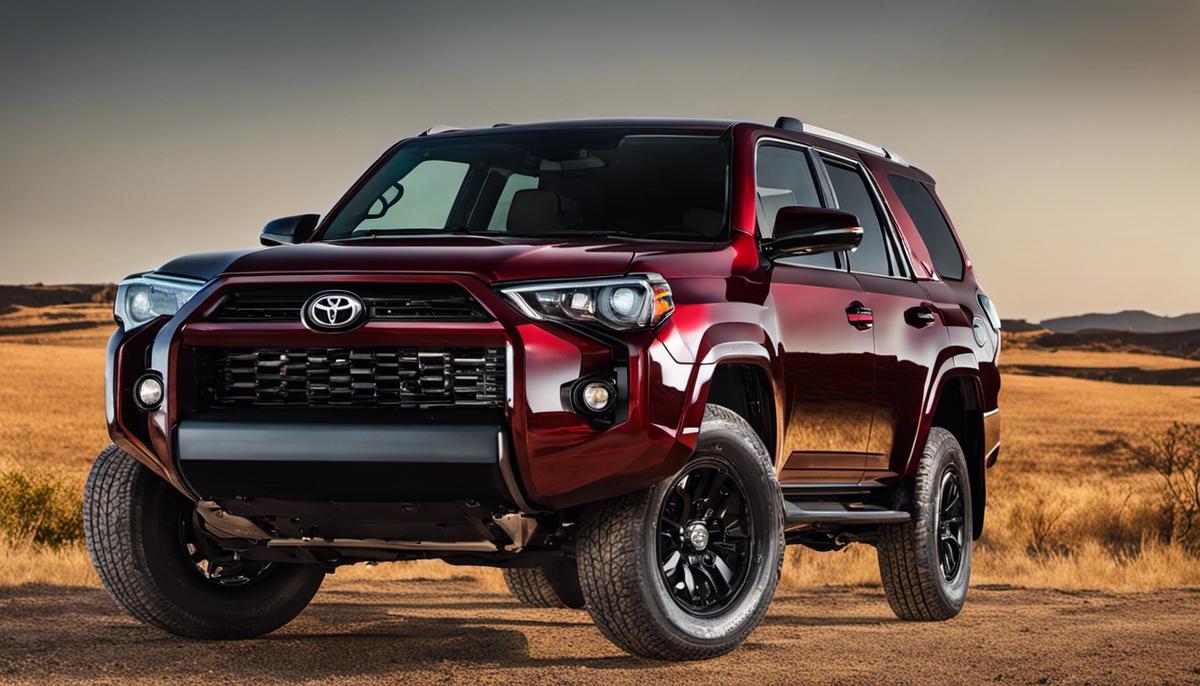Fuel Efficiency Analysis: 2020 Toyota 4Runner

Last Updated on October 17, 2023 by Christ
With the continually advancing automotive technology, fuel efficiency has become a cornerstone in automobile discussions. This is especially true for versatile vehicles like the 2020 4Runner, which seek to strike a balance between rugged off-road capabilities and day-to-day usability. In this discourse, we shed light on key factors surrounding the fuel efficiency aspects of the 2020 4Runner. Delving deep into the specifications, we unmask the intricate engineering and design behind this vehicle, how various integrated technologies in the engine module contribute to its consumption ratios, and just how it stacks up against other contenders in its category. Furthermore, taking a leap from laboratory readings, we scrutinize the real-world fuel efficiency garnered from driver experiences and industry data. Lastly, we explore the wide gamut of technological strides one can invest in or modify to optimize fuel efficiency without compromising on performance.
Contents
4Runner 2020 Specs
The Technological Beast: A Look at the 2020 Toyota 4Runner’s Key Technical Specifications
Lovers of sophisticated technology, settle in for a detailed look at a true marvel on wheels – The Toyota 4Runner 2020. Furbished with advanced technical gaming gadgets, this vehicle represents an exciting intersection of tech and automotive mastery.
This 4Runner model boasts a 4.0-liter V6 engine, mustering a robust 270 horsepower and 278 pound-feet of torque. This engine gives the 4Runner its much-lauded towing capacity of 5000 pounds, rightfully earning it a reputation as a strong contender in the off-road vehicle sector.
Fuel efficiency? Check. The 2020 4Runner’s stats stand at an EPA-estimated 16 mpg city/19 mpg highway/17 mpg combined. Note that these rates can vary slightly depending on the specific model. Regardless, efficiency is high on the 4Runner’s repertoire of features.
A standout feature of the 2020 4Runner is the integration of technology in the driver-assistance safety features. Incorporating the advanced Toyota Safety Sense P (TSS-P) system, the new 4Runner comes equipped with pre-collision systems, pedestrian detection, lane departure alert, automatic high beams, and dynamic radar cruise control.
Inside, the 4Runner’s cabin is a technological haven. With an 8.0-inch touchscreen infotainment system, smartphone integration through Apple CarPlay and Android Auto, Amazon Alexa compatibility, and an 8-speaker audio system, the 4Runner 2020 is no stranger to entertainment.
The vehicle’s connectivity features are also spotlight-worthy. Offering WiFi Connect Powered by Verizon, this technology allows up to five devices to connect, ensuring riders can stream, browse, and stay connected no matter the location.
The icing on the cake is the 4Runner’s compatibility with remote connect capability. This feature allows the driver to control certain aspects of the car remotely through a smartphone or smart device, such as locking and unlocking doors, starting and stopping the engine, and monitoring vehicle status.
The Toyota 4Runner 2020 is a striking embodiment of technological innovations that transform the driving experience into something more than just getting from point A to point B. An opportune example of where auto development is heading, the 4Runner is paving the way toward a future where technology and automobiles are harmoniously integrated. Buckle in; the tech transition in the automobile industry has just shifted gears up.

Engine technology
The engine technology embedded in the 2020 Toyota 4Runner not only enhances the vehicle’s fuel efficiency but also amalgamates technology and performance in unprecedented ways.
- The 4Runner 2020 makes use of a cutting-edge engine control system comprising a high-tech fuel injection system and an intelligent Continuously Variable Valve Timing (CVVT) technology.
The heart of the fuel injection system in the 4Runner is a technologically sophisticated Direct-On-Demand system. It is designed to evaluate and monitor the engine’s performance continuously, adjusting the fuel-air mix inside the cylinders for optimum performance and efficiency.
This system has a significant impact on the overall fuel consumption, ensuring that each cylinder receives an efficient amount of fuel, reducing wastage and promoting better mileage.
The 4Runner’s intelligent Continuously Variable Valve Timing (CVVT) technology enhances performance while improving fuel efficiency. This high-end tech adjusts the timing of the intake and exhaust valves according to the engine speed, load, and temperature.
It results in a better fuel-air mix entering the engine, resulting in a boost in fuel efficiency and the engine’s power output.
Furthermore, the 4Runner 2020 is designed to harness the power of automation through an advanced five-speed automatic transmission system. Shifting gears at precisely the right moment, this automated system ensures optimum power and performance at all times, while eliminating manual inefficiencies, contributing to improved fuel economy.
The engine technology in the 4Runner 2020 is a manifestation of Toyota’s commitment to incorporating innovations that not only improve the car’s performance but also significantly increase fuel efficiency.
At the crux of this is smart technology that does the thinking for us, ensuring optimal engine performance while simultaneously maximizing fuel economy.
In summarizing the technological features of the 2020 Toyota 4Runner’s engine that advance its fuel efficiency, we can conclude that automations, advanced fuel systems and variable valve timing all contribute in making this a most technologically sophisticated vehicle.
The brilliance of 4Runner 2020 reiterates how technology can be applied to make combustion engines increasingly efficient and eco-friendly.

Fuel efficiency comparison
Within the competitive space of midsize SUVs, the Toyota 4Runner’s fuel economy establishes a nuanced standing, making it crucial to delve into terms of comparison. It’s notable that the 2020 Toyota 4Runner touts a combined fuel economy of 17 miles per gallon. Broken down, it’s an estimated 16 MPG city and 19 MPG highway. This economy is impacted by factors such as the weight of the vehicle, drive-train, and the overall design efficiency.
Often juxtaposed alongside the 4Runner due to their similar class and price range, the 2020 Jeep Grand Cherokee and Ford Explorer provide critical case studies for comparison. The Grand Cherokee, with its standard 3.6-liter V6, achieves a combined fuel economy of up to 21 MPG. The Ford Explorer takes an even further leap with its base 2.3-liter turbo-four engine, averaging 24 MPG combined.
In real-world conditions, factors deviate from these estimates, where highway cruising could get nearer to the higher value, and city driving with stop-and-start traffic could pull the MPG rating down. However, these comparisons demonstrate that competitors like the Grand Cherokee and Explorer may offer better efficiency in certain driving conditions.
The 4Runner’s robust off-road capabilities and built-to-last design philosophy may lead to its less favorable MPG readings when compared to some rivals. Equipped with a robust build, heavy-duty suspension, and off-roading equipment, the 4Runner skews its design towards optimal performance in varying terrains rather than purely fuel-efficient street commuting. It’s a critical balance for any potential owner to consider, based on their lifestyle and driving requirements.
Ultimately, the fuel economy of the 2020 Toyota 4Runner may not appear as impressive when laid bare against its competitors. However, it’s essential to underscore that the automobile market involves more than simple numbers. Each SUV brings something unique to the table, with the 4Runner standing out with its off-road chops and rock-solid reliability. Consequently, technology enthusiasts who value these traits in an SUV will see beyond the initial MPG ratings, appreciating the comprehensive package that the Toyota 4Runner offers.

Real-world fuel efficiency
Shifting now toward the specifics of how the real-world fuel efficiency of the 2020 Toyota 4Runner measures up against its stated Environmental Protection Agency (EPA) ratings, it’s important to understand the realities faced on the open road often differ from those in test conditions. While the EPA has estimated the 4Runner’s fuel economy at 16 MPG city, 19 MPG highway, and an average of 17 MPG, real-world driving conditions may result in varied readings.
Historically, real-world MPG figures have been known to fall below official ratings, largely due to parameters set during standardized EPA testing. These testing situations may not reflect variabilities in factors like driving style and traffic conditions encountered in everyday driving scenarios. Similarly, the 2020 4Runner’s fuel efficiency in real-world situations might mirror this trend, depending on the driver and the conditions encountered.
Weighing nearly 5000 lbs, the 4Runner is one of the heavier vehicles in its class, and that weight can impact fuel economy. Additionally, its rugged, off-road features such as the high ground clearance for rock crawling and hill descent control, which make it such an appealing vehicle for outdoor enthusiasts, are not necessarily designed with optimal fuel economy in mind.
In terms of its drivetrain, the 4Runner has a full time 4WD system with Active Traction Control (A-TRAC), which enhances off-road capability but has a negative impact on fuel efficiency compared to vehicles with a two-wheel drive configuration.
Interestingly, however, there have been reports from drivers experiencing better fuel economy in real-world driving conditions than what the EPA ratings might suggest. Some owners have reported achieving as high as 22 MPG on the highway. This goes to show the level of variability that can be encountered based on factors such as driving style, terrain, and load.
In comparison to competitors, both the Jeep Grand Cherokee and the Ford Explorer offer superior fuel efficiency with up to 21 MPG and an average of 24 MPG respectively. However, it’s important to consider other factors when making a buying decision. The 4Runner outperforms nearly every competitor when it comes to reliability and off-road capability. It also boasts impressive towing capacity and a robust suite of driver-assistant features.
In conclusion, while potentially falling behind some competitors in terms of fuel efficiency, the 2020 4Runner presents a strong value proposition with its rock-solid reliability, off-road capabilities, and diverse range of tech features. For the consumer weighing the balance of fuel efficiency against these other characteristics, it is important to consider what best fits their lifestyle. After all, given the 4Runner’s built-to-tough philosophy, a few extra stops at the pump may be a small compromise for this impressive machine’s unparalleled capabilities and longevity.

Technological enhancements for fuel efficiency
Technology is pivotal in enhancing the fuel efficiency of vehicles, and the 2020 4Runner makes no exception. Toyota has implemented several tech-oriented solutions to fine-tune the SUV’s fuel economy. While certain enhancements are engineered features, there are also numerous habits that drivers can adopt to drive these benefits even further.
To start, Toyota employs a meticulously engineered ECO Mode designed to help 4Runner drivers conserve fuel. Activating ECO Mode modifies engine output, climate settings, and transmission shift timing, all with a push of a button. Each adjustment lean towards enhancing fuel efficiency, an undeniable trait of Toyota’s commitment to environmental sustainability.
Additionally, the integration of Active Traction Control (A-TRAC) further contributes to the 4Runner’s fuel efficiency. This advanced system distributes driving force optimally to all four wheels, thus reducing fuel wastage due to wheel spin on slippery or rocky terrains. This feature, along with a robust full-time 4WD system, offers a harmonious junction of off-road capabilities and fuel performance.
Habits play a significant role in fuel efficiency as well. By cautiously maintaining a steady speed, refraining from aggressive acceleration, and being mindful of braking, you can positively influence the performance and economy of the vehicle.
Furthermore, staying up-to-date with your vehicle’s maintenance schedule has an almost direct correlation to its fuel efficiency. Regular oil changes, tire pressure checks, and air filter replacements as recommended by Toyota can result in noticeable improvements in mileage.
The Kinetic Dynamic Suspension System (KDSS) and the Crawl Control feature also have noteworthy variances on fuel consumption. By optimizing suspension performance and automatically controlling engine output and brake pressure, these technologies ensure the best performance with the least fuel use, particularly during off-road adventures.
The final ace in the hole for fuel-efficient habits applies to all vehicles, not just the 4runner – manage your cargo weight. Every additional pound demands additional fuel to carry, so keeping your load light, even in an SUV designed for heavy utility, will contribute to the economy of your ride.
While the 2020 Toyota 4Runner may not be the fuel efficiency champion when it comes to miles per gallon figures compared to its competitors, it holds a unique blend of off-road prowess, robust reliability, and tech-enhanced abilities that potentially make it a worthwhile ownership experience. Each innovation and practice propels it one step further, bridging the gap between capability and efficiency. Then again, high fuel economy may not be the deciding factor for every user, especially given the 4Runner’s notorious off-road superiority and solid dependability. As it seems, one’s affinity for the Toyota 4Runner surely lies far beyond mere figures and statistics.

With a discerning eye on technology, our exploration of the 2020 4Runner’s fuel efficiency has taken us through a fascinating journey of understanding the impact of design, engine technologies, their comparison to market equivalents, and real-world usability. Moreover, we have examined how leveraging technological enhancements can lead to improved fuel economy. A vehicle like the 2020 4Runner, with its blend of sturdy construction and advanced engineering, presents ample opportunities for modifications aimed at achieving superior fuel efficiency. It is important to celebrate this finely curated balance that presents enthusiasts with not only the thrill of a high-performance vehicle but also the satisfaction of responsible and efficient fuel consumption. As we chart the future of automobiles, it is promising to witness how the implementation of technology enables us to create more sustainable driving experiences.
Leave a Reply